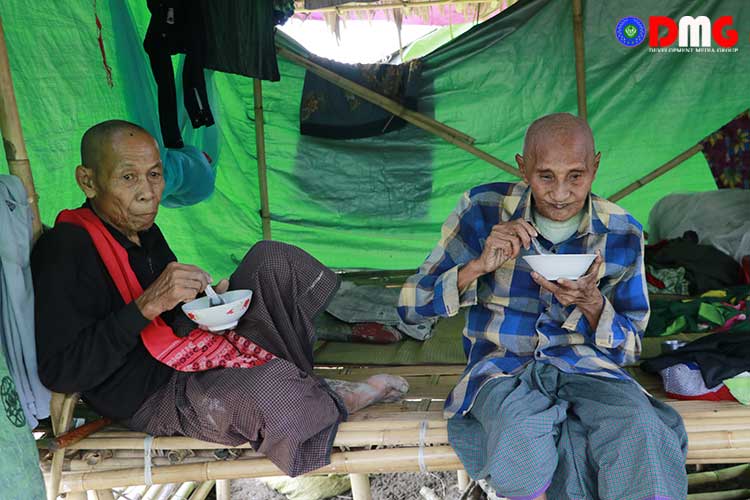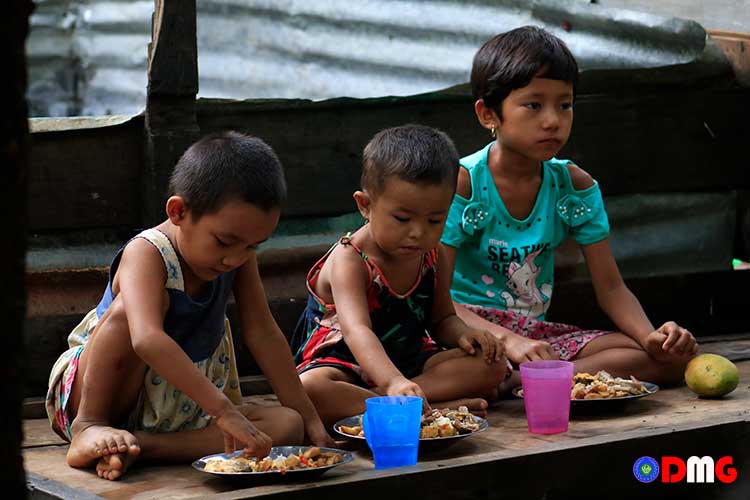- IDPs in Kyauktaw struggle with collapsing shelters amid aid shortages
- Travel restrictions deny Arakanese youth access to higher education
- Motorists fined K30,000 for traffic violations in AA controlled areas
- Inmates escape from Kyaukphyu Prison amid heightened security
- Arakan farmers struggle as paddy market collapses, debts mount
Heed the voice of the people
Currently Myanmar is slowly and steadily evolving into a democratic country. Yet, Arakan State is filled with the desperate sounds of weapons, screams, cries and moans. At this point in time the destitute people that live in utter squalor can only hope for a miracle.
29 Aug 2019

Written by Rakha | DMG
Global warming and climate change have noticeably affected Myanmar for the last three years. Myanmar experiences scorching heat and water scarcities during the summer and people face bone numbing cold weather during the winter in the most northern regions of the country.
Flooding has recently occurred in some townships including at least four townships in Arakan State. The flood victims from the IDP camps in Arakan state and its neighboring township Paletwa in Chin State have faced extra troubles during the flooding in spite of the seasonal amount of rain that falls.
The Department of Meteorology and Hydrology warned of the danger levels of the four main rivers in Myanmar on 13 July. The flood warning areas included: Myitkyeena, Bamaw, Shweku and Katha towns near the Ayeyarwaddy River, Hkamti and Homalin towns near Chindwin River, Madauk town near Sittaung River, Chin State’s Paletwa town, Arakan State’s Kyauktaw town near Kaladan River and Mrauk-U ancient city near Laymyo River. All these locations were exceedingly prone to severe flood waters.
Arakan State has become a region that faces natural disasters annually in recent years. Weather patterns connected to El Nino have dried up wells and lakes in most townships in the region during the summers of 2015 and 2016. Furthermore many townships in Arakan State have faced water scarcities in the summertime, and the last few summers were some of the worst. Meanwhile, almost all townships faced severe flooding in the rainy season
According to the records of the last 250 years, Arakan State was a region that faced the least amount of natural disasters. In AD 1755, at end of Mrauk-U era, Arakan was affected by a drought. In AD 1763, Arakanese people suffered from insufficient food due to bad weather which claimed many lives. In AD 1784, the Kaladan River’s banks burst open and floods covered the area up to the foot of Mahamuni Pagoda. The flooding also occurred in AD 1786 and AD 1840.
The natural disaster in AD 1884 claimed more than 100 people. The region experienced the risk of storms in 1926 and 1930. Storms occurred in 1936 which killed about 1000 people in Kyauk Phyu town, 144 people in Manaung town, 34 people in Rambree town and 813 people in Taunggup town.
Natural disasters ravished the region in 1948, 1952 and 1967 destroying MMK40 million worth of crops. Storms and tidal waves from the sea claimed 1037 people and 17,537 cattle in 1968.
The region also experienced storms in 1978, 1982, 1992, 2004, 2006 and 2010 respectively.
This year, heavy rain started on 10 July and caused flash floods in many townships in Arakan State, especially in Mrauk-U, Kyauktaw and Minbya townships. The rain in these areas lasted for at least six days, Arakanese media outlets reported.
The regional government has been criticized because it failed to issue flood warning announcements and could not protect people from the natural disasters. The government helped over 9000 flood victims acquire shelter, the Department of Disaster Management in Arakan State told Arakanese media outlets.
The recent flooding destroyed over 70,000 acres of cultivated farmland in Arakan State, according to the news released by Arakan State based media outlets.
Meanwhile, paddy cannot be grown on about 100,000 acres of farmland due to regional instability, the Arakan State Farmers’ Union said in the news. The Union also predicted that a scarcity of rice would occur in Arakan State in the coming years.
Some criticized that the failure to issue flood warnings and preparedness plans is the result of the Internet cut-off in the natural disaster affected areas. Flood victims from the IDP camps are in dire need of relief aid, but CSOs and relevant departments could not get to these areas in time.
The ongoing conflicts between the Tatmadaw and the Arakan Army (AA) in northern Arakan State have forced local residents from their homes and the number of IDPs has increased to 61,093, the Rakhine Ethnics Congress (REC) released on 18 August.
The Tatmadaw and the AA have intensified the armed conflicts since early December last year, many clashes occurred in all townships in northern Arakan State and Paletwa Township in Chin State. The number of IDPs has increased day by day in the conflict-ridden areas and the WFP and ICRC are allowed to enter to the conflict affected areas only when strict security measures are in place.
The government cut off the Internet access in Buthidaung, Maungdaw, Rathedaung, Ponnagyun, Kyauktaw, Mrauk-U, Minbya and Myebon townships in Arakan State and Paletwa Township in Chin State on 21 June. The cut-off has denied the region access to information that is vital for the day-to-day existence of people living in the area.

The recent flooding reportedly affected Tin Nyo, Mya Dasaung and Sin Baw Kaing IDP camps and about 40 villages in Kyauktaw Township.
People in IDP camps are refugees who flee from their homes and livelihoods due to clashes. They suffer appalling hardships and they are in dire need of food, shelter, health care and education access.
Moreover, diarrhea and dengue fever broke out in some IDP camps. So these types of health hazards put youngsters, pregnant women and elderly people in a very vulnerable position It is incumbent upon the appropriate authorities to authorities to immediately look into to these matters and find solutions to remedy these atrocious conditions that people are forced to endure on a daily basis.
Currently Myanmar is slowly and steadily evolving into a democratic country. Yet, Arakan State is filled with the desperate sounds of weapons, screams, cries and moans. At this point in time the destitute people that live in utter squalor can only hope for a miracle.
I’d like to suggest to authorities to heed the voice of the people to know their true feelings about the present affairs and situations that plague Arakan State so all the uprooted and displaced people know there is some glimmer of hope in the future.






.jpg)













